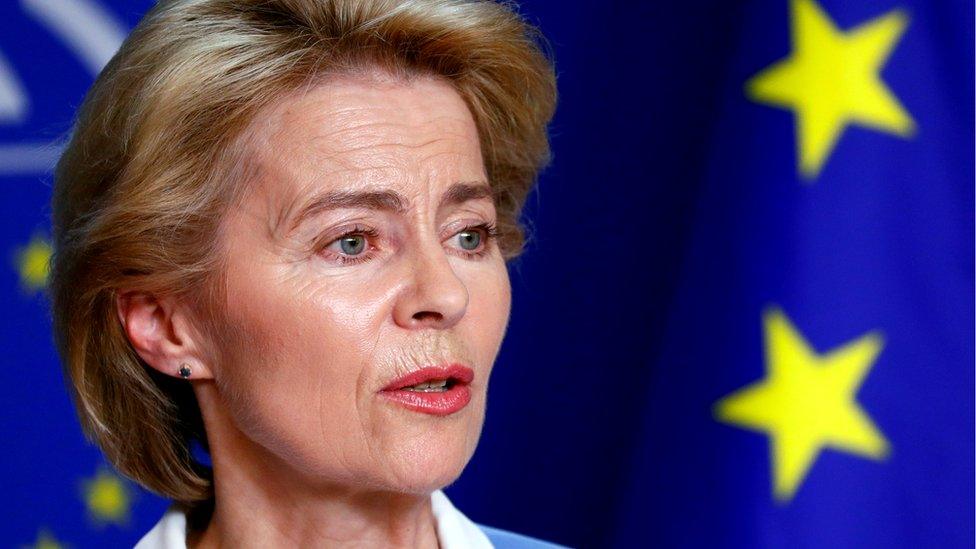EU top nominee von der Leyen in 'green deal' push for MEP votes
- Published
- comments
Ursula von der Leyen said she wanted Europe to be the first "climate-neutral" continent
The woman nominated to head the EU Commission, Ursula von der Leyen, has pledged to launch a "green deal for Europe", in a bid for MEPs' support.
Mrs von der Leyen spoke in the European Parliament ahead of a key vote on her candidacy, now taking place.
The outgoing German defence minister needs a majority to take charge.
On Brexit, she said "I stand ready for a further extension of the [UK] withdrawal date, should more time be required for a good reason".
MEPs reacted with a mixture of applause and boos.
"In any case the UK will remain our ally, our partner and our friend," she said, defending the existing withdrawal deal, reached with Prime Minister Theresa May but rejected by the UK Parliament, which the EU has vowed not to reopen.
The UK prime minister's successor is due to be revealed next week, while the country is currently scheduled to leave the EU on 31 October.
If Mrs von der Leyen wins the vote in Strasbourg on Tuesday evening, she will replace EU Commission President Jean-Claude Juncker on 1 November. She is a centre-right politician close to German Chancellor Angela Merkel.
Mrs von der Leyen, 60, has been criticised in Germany over the armed forces' persistent equipment shortages and what some consider to be her aloof management style.
Push for climate investment
On climate change, she said "I will propose a sustainable Europe investment bank", to unlock substantially more investment in renewable energy and other measures over the next decade.
The new "green deal" - promised within Mrs von der Leyen's first 100 days - would aim to make the EU carbon neutral by 2050, whereby carbon pollution is balanced by green measures such as planting trees. The UK has already set a 2050 deadline for becoming carbon neutral.
"It means change - all of us will have to contribute… in the way each of us travels and lives. Emissions must have a price that changes our behaviour," she said.
She said the EU's current target of cutting carbon emissions by 40% by 2030 was not enough. The goal should be 50%, if not 55%, she said.
The Commission drafts EU laws and enforces EU rules, with power to impose fines on member states if necessary.
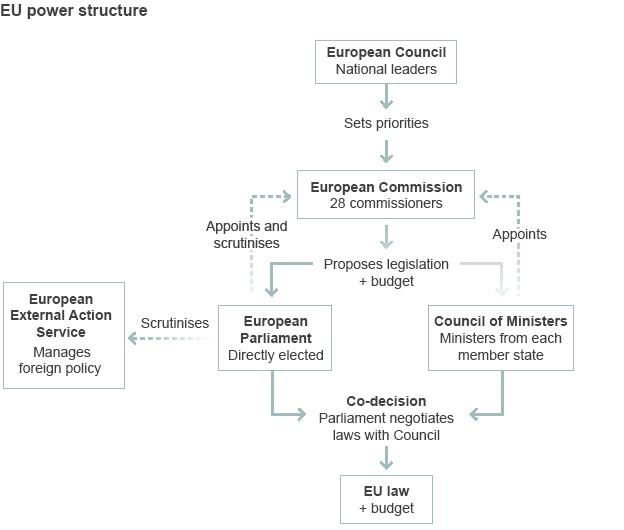

The MEPs' confirmation vote - a secret ballot - could be close, as many left-wingers and the Green group will oppose her. She was not one of the top candidates put before the European electorate in May.
Significantly, she received the support of the centre-left Socialists and Democrats and the liberal Renew Europe bloc.
Allow X content?
This article contains content provided by X. We ask for your permission before anything is loaded, as they may be using cookies and other technologies. You may want to read X’s cookie policy, external and privacy policy, external before accepting. To view this content choose ‘accept and continue’.

However, many MEPs still resent the fact that the parties' top candidates ("Spitzenkandidaten") were rejected by EU government leaders.
The German Social Democrats (SPD), junior partners in Mrs Merkel's government, lobbied against Mrs von der Leyen, attacking her record as defence minister.
The UK Brexit Party, who came top in the UK European election, poured scorn on her candidacy, while Italy's ruling coalition agreed to back her.


She made the bulk of her 43-minute speech in English, external, but there were passages in French and German too - part of her pitch to represent the whole of Europe.
Born in Brussels, she has seven children and trained as a gynaecologist before entering politics.

What if Mrs von der Leyen is rejected?
The BBC's Damian Grammaticas in Strasbourg writes:
It's the scenario many in the EU simply don't want to contemplate. So there are no official plans in place for what to do if Ursula von der Leyen is rejected by MEPs.
But if MEPs fail to confirm her there will be an unprecedented confrontation that could last all summer, between the European Parliament and the national leaders.
It took the leaders 50 hours of tortuous negotiations and difficult compromises to come up with Mrs von der Leyen's name - a surprise choice, who hadn't been mentioned before.
They'd have to meet again, likely at a new emergency summit in the coming weeks, to make a new choice for the four top jobs they have to fill: the European Commission, the European Council, the EU's foreign policy chief and head of the European Central Bank.
It's far from clear if they have any other surprise candidates to call on. And they may not be keen to undo all the compromises they've already made, having found women candidates to lead both the Commission and the Bank, as well as a balance between the EU's main political groups.
So the other option is to go back to names previously considered, such as German conservative Manfred Weber or Dutch socialist Frans Timmermans. But the same problems will still exist as before. A long hot summer of bargaining may await.

'Fair share for women'
She promised a big push for the EU to play a bigger role in social welfare, to tackle poverty, and stressed that she would stand up for women's rights.
"If not enough female commissioners are proposed I'll not hesitate to ask for new names," she said. Each of the 28 member states has a commissioner in Brussels.
"We want our fair share," she said, noting that of 183 EU commissioners in the past, just 35 were women.
In Tuesday's vote she needs 374 MEPs to back her, out of 747 in total.
In all, 751 were elected in May, but four MEPs are absent.
Mrs von der Leyen made some other significant pledges in her wide-ranging speech:
She would push to give the European Parliament "the right of initiative" - meaning the Commission would have to legislate on MEPs' resolutions; currently only the Commission can draft laws
On irregular migration to the EU, she said she would boost the EU's border force Frontex to 10,000 staff by 2024, but said "we need to preserve the right to asylum through humanitarian corridors"
She offered an EU "reinsurance scheme" to bolster national insurance schemes for the unemployed.
- Published16 July 2019
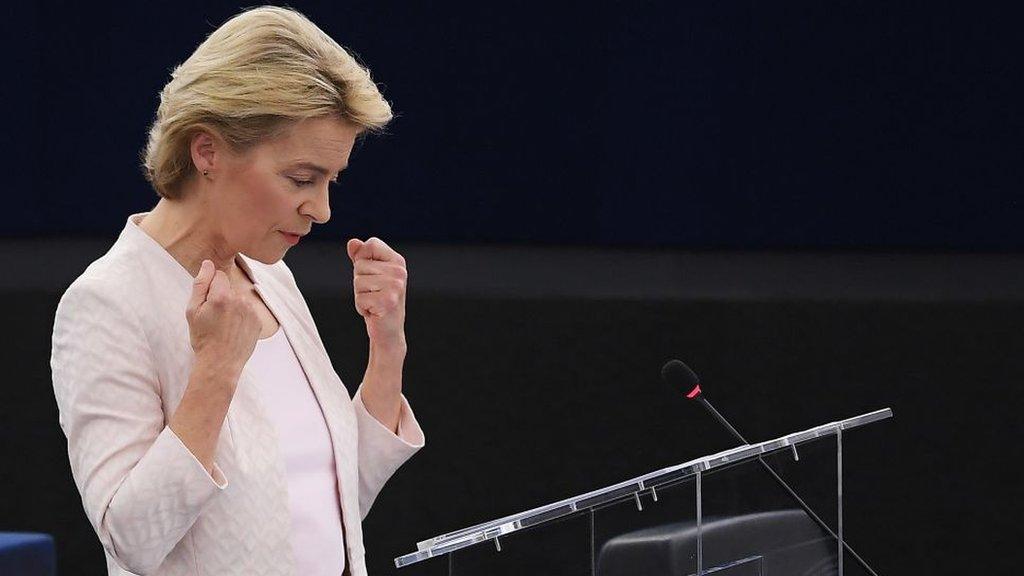
- Published16 July 2019
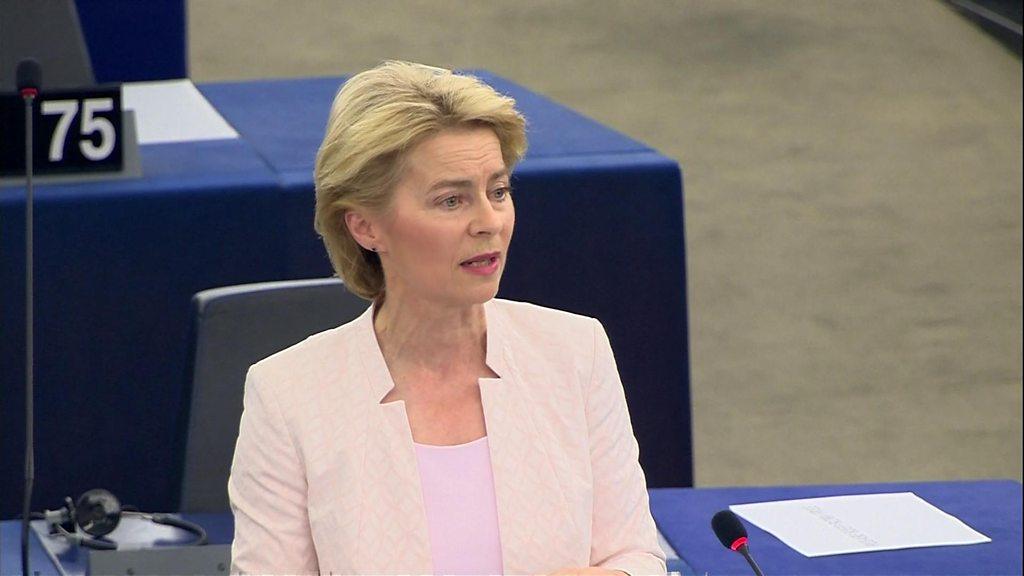
- Published10 July 2019
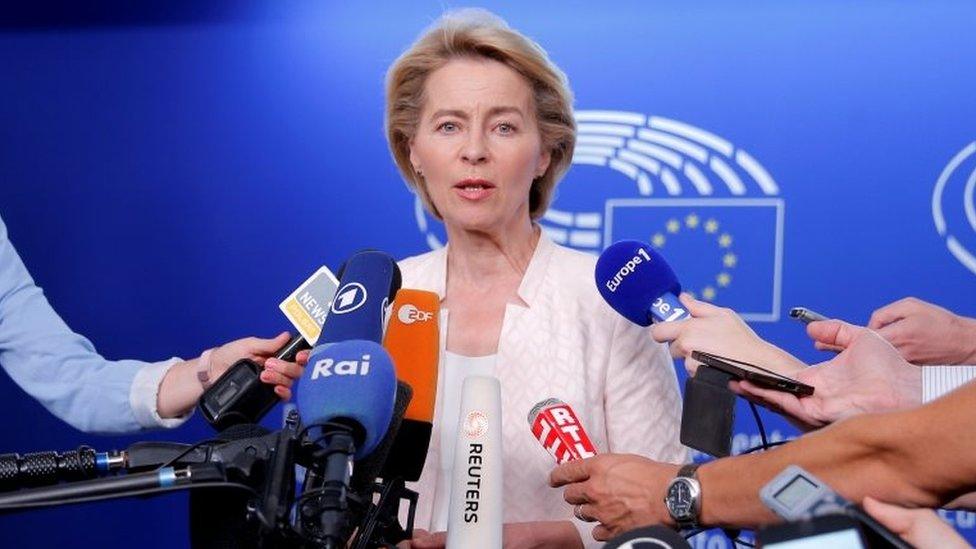
- Published11 December 2020
